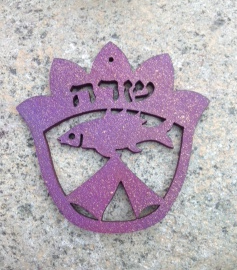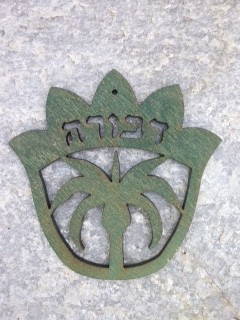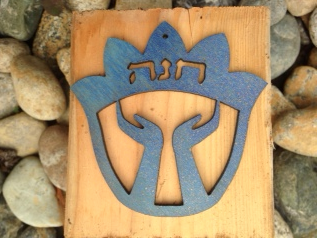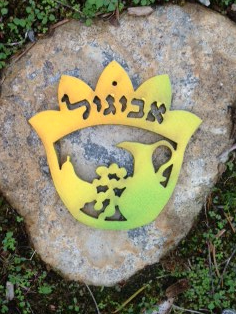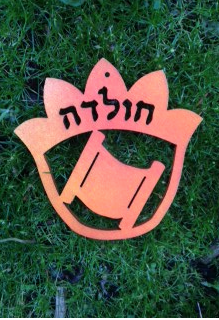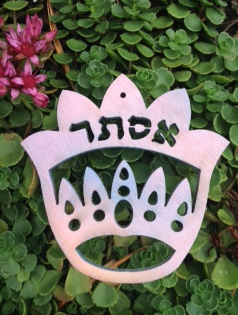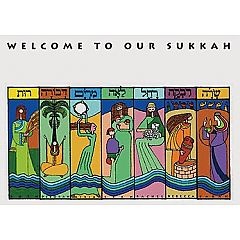 I’ve been enjoying the Jewish holiday of Sukkot this past week. The festival is named after “sukkah,” the Hebrew word for “booths” mentioned in Leviticus:
I’ve been enjoying the Jewish holiday of Sukkot this past week. The festival is named after “sukkah,” the Hebrew word for “booths” mentioned in Leviticus:
“On the fifteenth day of this seventh month there shall be the Feast of Booths to the Lord, [to last] seven days…You shall live in booths seven days…in order that future generations may know that I made the Israelite people live in booths when I brought them out of the Land of Egypt, I the Lord your God” (Lev. 23:33, 42-3).
This joyful holiday has been celebrated for thousands of years with feasts and get-togethers inside the temporary structures. Unfortunately I didn’t have an opportunity to set up my sukkah this year. I’ll share a picture of it next year.
A custom originating with the Lurianic Kabbalah (a medieval mystical Jewish document) “invites” one of seven “spiritual guests” into the sukkah each day of the festival. These guests are called “ushpizin” which means “guests” in Aramaic. Traditionally these ushpizin were Abraham, Isaac, Jacob, Moses, Aaron, Joseph and David and each guest has a spiritual lesson to give on the day they visit.
In 1597 the kabbalist Rabbi Menahem Azaria of Fano wrote that seven prophetesses in the Hebrew Bible correspond to seven spiritual attributes of God (sephirot). According to the Babylonian Talmud seven women preached to Israel: Sarah, Miriam, Deborah, Hannah, Abigail, Huldah and Esther.
As a later development, the seven women were linked to the seven guests invited into the sukkah. We use the feminine form “ushpizot” to refer to these seven visitors. This practice has not been standardized, so some communities invite a different set of women into their sukkahs than the prophetesses (most commonly, Rebecca, Rachel, Leah, Miriam, Hannah and Esther; Ritualwell has developed a ceremony to welcome these women into a sukkah).
I’m quite taken with the prophetesses, so I invite the women who spoke oracles into my hut. Here’s my rendition of a ceremony to welcome the prophetesses. Feel free to use it if you find it meaningful. The photos are of the decorations I use in my sukkah to commemorate the seven prophetesses. Happy sukkot!
Ushpizot of the Seven Prophetesses
“The rabbis taught: Forty-eight prophets and seven prophetesses preached to Israel…Who were the seven prophetesses? Sarah, Miriam, Deborah, Hannah, Abigail, Huldah, Esther.” (Tractate Megillah)
Day One
We welcome you, Sarah, who heard God’s voice. From you we learn loving-kindness (hesed).
Action: shake lulav to the right.
“But God said to Abraham, Do not be distressed because of the lad and your maid; whatever Sarah tells you, listen to her, for through Isaac your descendants shall be named” (Genesis 21:12).
“We call upon Sarah the priestess, co-founder of Judaism, who gave us the candle-lighting ceremony. Beautiful and holy princess, she celebrated in sacred groves and a simple tent, bringing the light of the Shekhinah wherever she traveled. Laughing mother of ageless beauty, bless our way.” (Leah Novick, excerpted from Appeal to the Matriarchs)
Sarah, our holy guest be seated in our sukkah under the shade of the Shekhinah that we may learn loving-kindness from you.
Day Two
We welcome you, Miriam, who sang and danced for God. From you we learn strength (gevura).
Action: shake lulav to the left.
“Then Miriam the Prophetess, Aaron’s sister, took her drum in her hand, and all the women followed her out, with drums and dances. And Miriam sang to them …” (Exodus 15:20-21).
“Miriam, as it is written [Ex. xv. 26]: “Then took Miriam the prophetess, the sister of Aaron.” Aaron’s, and not Moses’ sister? Said R. Na’hman in the name of Rabh: She had prophesied even when she had been yet but Aaron’s sister, before Moses’ birth, and she said: In the future my mother will give birth to a child that will deliver the Israelites. Finally, when Moses was born, the whole house was filled with light. And her father rose, and kissed her on her head, and said: Daughter, thy prophecy is fulfilled. Afterward, when he was cast into the river, the father asked: Daughter, what has become of thy prophecy? And this is what is written [ibid. ii. 4]: “And his sister placed herself afar off, to ascertain what would be done to him,” i.e., to know what would be the end of her prophecy” (Babylonian Talmud: Tractate Megillah).
Miriam, our holy guest, be seated in our sukkah under the shade of the Shekhinah that we may learn spiritual strength.
Day Three
We welcome you, Deborah, who spoke the truth. From you we learn to appreciate beauty (tiferet).
Action: shake lulav to the front.
“Now Deborah, a Prophetess… judged Israel at that time. And she sat under the palm-tree of Deborah …. in the hills of Ephraim” (Judges 4:4).
“Deborah, great warrior, judge and mother in Israel, your fiery example inspires us to take action. We long to know more of your words and yearn to take your poetry into our hearts and minds. Warrior mother, we need your energy now to sacralize the political and create leaders that embody your prophetic leadership” (Leah Novick, excerpted from Appeal to the Matriarchs).
Deborah, our holy guest, be seated in our sukkah under the shade of the Shekhinah that we may learn about the splendor of God.
Day Four
We welcome you, Hannah, who dared to pray out loud. From you we learn about eternity (netzach).
Action: shake lulav toward the heavens.
“Hannah was considered as a prophetess by Jonathan b. Uzziel. In his targum he thus explains the first five verses of I Sam. ii. as being a prophecy: Verses 1, 2: These indicate that her son Samuel would be a prophet, and that her great-grandson, Heman, the singer, would stand with his fourteen sons among the musicians in the Temple. Verses 3-5: These foretell the rout of Sennacherib; the fall of Nebuchadnezzar and that of the Macedonian kingdom; the fatal end of Haman’s sons; and thereturn of Israel from Babylon to Jerusalem. Hannah is likewise counted among the seven prophetesses in Meg. 14a” (Jewish Encyclopedia, “Hannah”).
“…and she prayed to the Lord exceedingly. Hannah spoke devotedly from her heart; only her lips moved, but her voice could not be heard” (1 Samuel 1:12).
Hannah, our holy guest, be seated in our sukkah under the shade of the Shekhinah that we may learn about eternity.
Day Five
We welcome you, Abigail, who used her wise words to bring peace. From you we learn about the glory of God (hod).
Action: shake lulav toward the earth.
“Abigail, as it is written [I Sam. xxv. 31]: ‘And when the Lord will do good unto my lord.’ She prophesied that he would be king” (Babylonian Talmud: Tractate Megillah).
“[Abigail], forceful woman of Carmel, you foresaw David’s future; feeding and welcoming the outlaw chief when his life was in jeopardy. Becoming his wife in hard times, before he was king and psalmist, you supported the emergence of genius. Clairvoyant mother, send us your insight so we might have the strength to trust and follow our intuitions” (Leah Novick, excerpted from Appeal to the Matriarchs).
Abigail, our holy guest, be seated in our sukkah under the shade of the Shekhinah that we may learn about God’s glory.
Day Six
We welcome you, Huldah, who used her intelligence to bring wisdom to the world. From you we learn about that righteousness is the foundation of the world (yesod).
Action: shake lulav behind you.
“So the priest Hilkiah . . . went to the Prophetess Huldah, wife of Shallum . . . And she said to them, “Thus says the Lord: Behold, I will bring evil upon this place and its inhabitants fulfilling all the words in the Book . . .because they have forsaken me and sacrificed to other gods . . . ” (2 Kings 22:14)
“Huldah, preacher at the Southern gates of the Temple, you were consulted on important religious matters, like your cousin Jeremiah. You, whose teaching comes to us in your advice to King Josiah, are needed now. Prophetic mother, help us find the deep learning of enlightenment and peace” (Leah Novick, excerpted from Appeal to the Matriarchs).
Huldah, our holy guest, be seated in our sukkah under the shade of the Shekhinah that we may learn about the foundation of the world.
Day Seven
We welcome you, Esther, who risked her life for the sack of bringing justice. From you we learn about queenship (malchut).
Action: smell the perfume of the etrog.
“And Esther, because it is written [Esther, v. 7]: ‘Esther put on royalty.’ It should be written, ‘royal apparel’? That means, she clothed herself in the Holy Spirit, and this is inferred from an analogy of expression; here it is written, ‘she put on,’ and in I Chron. xii. 18, ‘a spirit invested Amassoi.’ As there the Holy Spirit is meant, so here” (Babylonian Talmud: Tractate Megillah).
“Esther, gentle queen with premonitory knowledge that propelled you to save your people, whether you are historical or mythological, we are touched by your story. How you must have feared your awesome destiny, overcoming fear with transcendent faith. Royal mother, bless us with inner strength to overcome the obstacles that block us from fulfilling our sacred assignments” (Leah Novick, excerpted from Appeal to the Matriarchs).
Esther, our holy guest, be seated in our sukkah under the shade of the Shekhinah that we may learn about the royalty of the spirit.
Final Prayer
May it be Your will, Lord my God and God of my ancestors,
To allow Your holy spirit to dwell in our midst;
Spread over us the shelter of Your peace;
Encircle us with the majesty of Your pure and holy glory. Give sufficient bread and water to all who are hungry and thirsty. Grant us many days to grow old upon the earth, the holy land, That we may serve and revere You.
Blessed be the Lord forever. Amen, amen.

